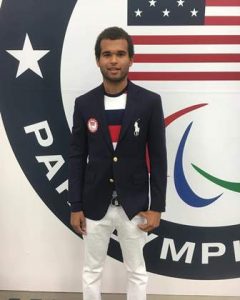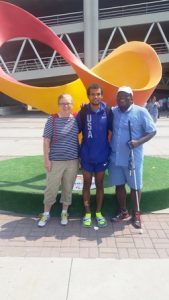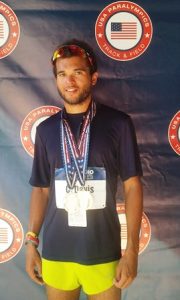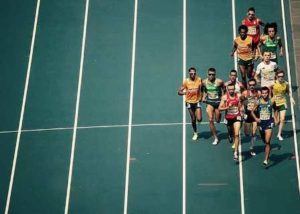
By John Orrell, Contributing Writer
Grafton — Not long ago, the prospect of being honored at the White House by the President, Vice President and First Lady could not have been further from the mindset of Grafton’s Chaz Davis.
That all changed when he and fellow Olympic and Paralympic athletes were received in Washington on a warm, late September afternoon. The hugely celebratory nature of it all left the well-spoken 23 year-old Davis, who admits to the awe of the moment, virtually speechless. But respect and admiration can be expressed in other than words, as he found out.
“She gives hugs,” a smiling Davis said of his warmest of greetings from First Lady Michelle Obama.
The road to the lofty heights of success has been anything but easy for the Paralympic runner, who recently competed in the Games held last month in Rio de Janeiro. Davis finished eighth (3:58.28, a personal best and an approximate 4:17 per mile pace) in the 1500 meter event and tenth (15:15.86) in the 5000 meters, but it is the strength and courage behind these big stage accomplishments of this instantly-likeable young man that resonate the most.
Davis admits that his early-age exposure to sports was rocky at best. Nothing clicked until high school when running began to feel natural to him despite having rawness in skill that would be corrected through hard work and training as well as coaching. Grafton High track and field head coach Peter Gleason would play a dominant and influential role in his athletic development.
“Chaz was definitely raw when he started with us but he knew he had talent that would lead to success if he stuck with it and he did,” said Gleason. “From the beginning, he always had fight and tenacity that allowed him to rise to the occasion in the biggest of moments.”
It wasn’t long before Davis was racking up accomplishments that most competitors could only dream of. He became a Central Massachusetts Cross Country District Champion, Division 4 Massachusetts State Champion in the two-mile run, two-time District Champion in the indoor mile-run and was selected for the T&G Cross Country Super Team while earning 12 varsity letters.
His remarkable high school success led him to the University of Hartford (UH) where his track and cross-country accomplishments were so lengthy that personal bests and team victories mounted in astonishing numbers. Davis was at or near the pinnacle of superiority in his chosen sport and at that point, it was nothing short of sky’s the limit.
But so much changed in the spring of his freshman year at UH when a rare and nearly irreversible insidious disease known as Leber’s Hereditary Optic Neuropathy (LHON) took hold of Davis’s life bringing all the good things to a screeching halt, at least temporarily.
“It really wasn’t that bad at first because I didn’t know the severity of it and the magnitude of it all,” Davis explained. “I went to sleep with perfect vision in both eyes and woke up the next day and my right eye was essentially blind. It’s essentially where things are now where everything is a blur to where I can’t use that as one of my senses.
“I went to class but I realized that if I covered my left eye I couldn’t see the board and the professor would disappear practically. I ended up calling my parents and we wound up going to the hospital where we had a battery of tests done but they weren’t able to come up with any diagnosis. So I went back and finished the academic year and continued with athletics.”
It was in May that Davis received the actual diagnosis of LHON. “At that point when I was told that I would lose vision in both eyes and never see again, that’s when it set in that I was going to be blind for the rest of my life most likely.
“That summer I spent it just sitting in my room not caring or doing anything but then I got all of my adaptive technology. I had no idea how to use it but I knew if I wanted to continue with school, I basically had to learn on the fly. I had some training while I was going to class but I wasn’t doing any of the running I was used to because all that basically took a sideline to athletics.
“Running was my existence at that time. It was a part of my routine so having to give that up, I started to fall into other things that weren’t positive to deal with the emotional toll. I saw myself spiraling out of control and it just wasn’t going to be the best situation for me long term. I knew I needed to find my way back into running again.”
Davis did just that and returned to successful form often clocking in with better times than before his sight loss. Hard work and set-goals set drove him to return to the sport that is his passion and for years had defined him. The transition was far from easy and took every ounce of determination he could muster, said Roger Busch, former Director of Track & Field and Cross Country at University of Hartford, who now coaches in his native Indiana.
“It was definitely an emotional challenge for Chaz and no doubt, he struggled as anyone would, but he is one strong and resilient young man. He has dealt with adversity and still did all the right things on the team. I’m pleased to have had a chance to coach Chaz and I’m going to miss him. He was a great teammate and always worked his hardest even though under tough conditions.”
It was also in 2013 that Davis heard about the Paralympics and learned that visually impaired or blind people could compete against other people with visual impairments. He knew that was a long way off because at that point he wasn’t running at all. He admits to having gained weight and had no idea how he was going to get to that point of making the team so he set goals that he knew were attainable but would require extreme commitment.
With encouragement from family, friends and co-competitors in the running world, he entered the Paralympics national championship in 2015 in Minneapolis and won the 5000-meters national championship. It was next on to the Parapan American games in Toronto where he took home the silver medal, also in the 5000-meter event.
It was then off to the Paralympic Games in Brazil in September where he competed before 30,000 amped-up fans. The experience was monumental for Davis who knew he had reached his goals and also found time to take in the atmosphere that, he says, was far different than what had been reflected in the media.
“The people down there were really nice and helpful. The Athlete Village was great, the accommodations were good. Brazil was a great host and it was all a great experience.
“I made friendships and it was cool to be in that environment in front of 30,000 screaming fans. Getting to the Paralympics was the goal that I had set for myself so everything after that was just icing on the cake. I didn’t want to put any pressure on myself that might get in the way of my performance.”
Running is back and back for keeps for Davis who aspires to return to the big stage once more. He has set the Paralympic Games in Tokyo in 2020 as a goal as well as the world championships next fall in London. He also plans to run his first-ever marathon, the California International Marathon, which will be held on December 3 in Sacramento.
But before all of that, there remains a focus on further adjusting to his sight loss with a goal of increasing independence more and more as time goes on. He graduated magna cum laude this past May earning a bachelor’s degree in criminal justice and psychology. Graduate school is a set-goal for some point in the future. Also, later this month, he leaves for ten months to the Colorado Center for the Blind where he will begin to learn braille, mobility, cooking, life skills and more.
“Ever since I lost my sight I’ve been seeking to find that independence because I’ve always been an independent person so having to rely on other people has been a challenge, mostly mentally. If I can get those skills back I can really prosper.”


















